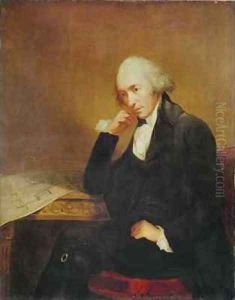Carl Frederick von Breda Paintings
Carl Frederick von Breda was a distinguished Swedish painter, known primarily for his portraits, who made a significant contribution to the art world in the late 18th and early 19th centuries. Born on August 16, 1759, in Stockholm, Sweden, von Breda came from a lineage of artists, which profoundly influenced his early interest and eventual career path in the arts. His grandfather, Lukas von Breda, was also a painter, and his father, Johan Fredrik von Breda, was an architect. This artistic environment nurtured his talents from a young age, providing him with a solid foundation in the principles of art and design.
In pursuit of his passion, Carl Frederick initially trained under his uncle, the portraitist Pehr Hilleström, in Sweden. This training not only honed his skills but also deeply embedded him in the Swedish art scene. His talent and ambition led him to further his studies abroad, which was a common practice among artists seeking to refine their craft. Thus, he moved to London in the 1780s, where he studied under the renowned Joshua Reynolds. Under Reynolds' mentorship, von Breda was exposed to the English style of portraiture, which significantly influenced his artistic approach. This period was crucial in his development as an artist, as he absorbed the nuances of British art and culture, which he later amalgamated with his Scandinavian sensibilities.
Von Breda's work is characterized by its elegant realism, a quality that made his portraits highly sought after. He was particularly adept at capturing the psychological depth of his subjects, a skill that endeared him to many high-profile clients. Among his notable works is the portrait of Benjamin Franklin, a testament to his international reputation and the esteem in which he was held. After his productive stay in England, von Breda returned to Sweden, where he continued to work and contribute to the Swedish art scene. He became a member of the Royal Swedish Academy of Arts and served as a professor, influencing a new generation of Swedish artists.
Carl Frederick von Breda's legacy is marked by his contributions to portraiture and the cultural exchange between Sweden and Britain during his lifetime. His ability to blend the stylistic elements of British portraiture with Swedish tradition created a distinctive body of work that remains appreciated for its technical skill and emotional depth. Von Breda passed away on December 1, 1818, in Stockholm, leaving behind a rich portfolio of work that continues to be studied and admired. His paintings are not only valuable artistic documents of their time but also serve as enduring examples of the cross-cultural fertilization in European art during the late 18th and early 19th centuries.

